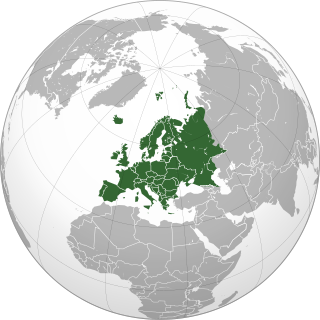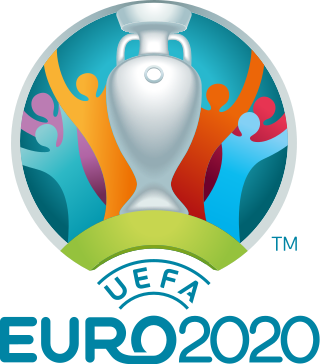
The Czech Republic had the second highest rate of obesity in Europe in 2015. 28.7% of the adult population had a body mass index of 30 or more. [1]

The Czech Republic had the second highest rate of obesity in Europe in 2015. 28.7% of the adult population had a body mass index of 30 or more. [1]

Europe is a large peninsula conventionally considered a continent in its own right because of its great physical size and the weight of its history and traditions. Europe is also considered a subcontinent of Eurasia and it is located entirely in the Northern Hemisphere and mostly in the Eastern Hemisphere. Comprising the westernmost peninsulas of Eurasia, it shares the continental landmass of Afro-Eurasia with both Africa and Asia. It is bordered by the Arctic Ocean to the north, the Atlantic Ocean to the west, the Mediterranean Sea to the south and Asia to the east. Europe is commonly considered to be separated from Asia by the watershed of the Ural Mountains, the Ural River, the Caspian Sea, the Greater Caucasus, the Black Sea and the waterways of the Turkish Straits.

The European Union (EU) is a supranational political and economic union of 27 member states that are located primarily in Europe. The union has a total area of 4,233,255.3 km2 (1,634,469.0 sq mi) and an estimated total population of about 447 million. The EU has often been described as a sui generis political entity combining the characteristics of both a federation and a confederation.

The euro is the official currency of 20 of the 27 member states of the European Union (EU). This group of states is known as the eurozone or, officially, the euro area, and includes about 344 million citizens as of 2023. The euro is divided into 100 cents.

Greece, officially the Hellenic Republic, is a country in Southeast Europe. It is situated on the southern tip of the Balkan Peninsula, and is located at the crossroads of Europe, Asia, and Africa. Greece shares land borders with Albania to the northwest, North Macedonia and Bulgaria to the north, and Turkey to the northeast. The Aegean Sea lies to the east of the mainland, the Ionian Sea to the west, and the Sea of Crete and the Mediterranean Sea to the south. Greece has the longest coastline on the Mediterranean Basin, featuring thousands of islands. The country consists of nine traditional geographic regions, and has a population of approximately 10.4 million. Athens is the nation's capital and largest city, followed by Thessaloniki and Patras.

Liverpool Football Club is a professional football club based in Liverpool, England. The club competes in the Premier League, the top tier of English football. Founded in 1892, the club joined the Football League the following year and has played its home games at Anfield since its formation.

In the history of Europe, the Middle Ages or medieval period lasted approximately from the late 5th to the late 15th centuries, similar to the post-classical period of global history. It began with the fall of the Western Roman Empire and transitioned into the Renaissance and the Age of Discovery. The Middle Ages is the middle period of the three traditional divisions of Western history: classical antiquity, the medieval period, and the modern period. The medieval period is itself subdivided into the Early, High, and Late Middle Ages.

The Renaissance is a period in European history marking the transition from the Middle Ages to modernity and covering the 15th and 16th centuries, characterized by an effort to revive and surpass ideas and achievements of classical antiquity. It occurred after the Crisis of the Late Middle Ages and was associated with great social change. In addition to the standard periodization, proponents of a "long Renaissance" may put its beginning in the 14th century and its end in the 17th century.

Real Madrid Club de Fútbol, commonly referred to as Real Madrid, is a Spanish professional football club based in Madrid.

World War II or the Second World War, often abbreviated as WWII or WW2, was a global conflict that lasted from 1939 to 1945. The vast majority of the world's countries, including all of the great powers, fought as part of two opposing military alliances: the Allies and the Axis. Many participants threw their economic, industrial, and scientific capabilities behind this total war, blurring the distinction between civilian and military resources. Aircraft played a major role, enabling the strategic bombing of population centres and the only two nuclear weapons ever used in war.

Western Europe is the western region of Europe. The region's countries and territories vary depending on context.

Eastern Europe is a subregion of the European continent. As a largely ambiguous term, it has a wide range of geopolitical, geographical, ethnic, cultural, and socio-economic connotations. The vast majority of the region is covered by Russia, which spans roughly 40% of the continent's landmass while accounting for approximately 15% of its total population.

The UEFA Champions League is an annual club football competition organised by the Union of European Football Associations (UEFA) and contested by top-division European clubs, deciding the competition winners through a round robin group stage to qualify for a double-legged knockout format, and a single leg final. It is one of the most prestigious football tournaments in the world and the most prestigious club competition in European football, played by the national league champions of their national associations.

Futbol Club Barcelona, commonly referred to as Barcelona and colloquially known as Barça, is a professional football club based in Barcelona, Catalonia, Spain, that competes in La Liga, the top flight of Spanish football.

The EFL Cup, currently known as the Carabao Cup for sponsorship reasons, is an annual knockout competition and major trophy in men's domestic football in England. Organised by the English Football League (EFL), it is open to any club within the top four levels of the English football league system – 92 clubs in total – comprising the top-level Premier League, and the three divisions of the English Football League's own league competition.

Ashkenazi Jews, also known as Ashkenazic Jews or Ashkenazim, are a Jewish diaspora population who coalesced in the Holy Roman Empire around the end of the first millennium CE. Their traditional diaspora language is Yiddish, which developed during the Middle Ages after they had moved from Germany and France into Northern Europe and Eastern Europe. For centuries, Ashkenazim in Europe used Hebrew only as a sacred language until the revival of Hebrew as a common language in 20th-century Israel.

The UEFA European Football Championship, less formally the European Championship and informally the Euro, is the primary association football tournament organised by the Union of European Football Associations (UEFA). The competition is contested by UEFA members' senior men's national teams, determining the continental champion of Europe. It is the second-most watched football tournament in the world after the FIFA World Cup. The Euro 2012 final was watched by a global audience of around 300 million. The competition has been held every four years since 1960, except for 2020, when it was postponed until 2021 due to the COVID-19 pandemic in Europe, but kept the name Euro 2020. Scheduled to be in the even-numbered year between FIFA World Cup tournaments, it was originally called the European Nations' Cup, changing to the current name in 1968. Since 1996, the individual events have been branded as "UEFA Euro [year]".

Proto-Indo-European (PIE) is the reconstructed common ancestor of the Indo-European language family. Its proposed features have been derived by linguistic reconstruction from documented Indo-European languages. No direct record of Proto-Indo-European exists.

The Western world, also known as the West, primarily refers to various nations and states in the regions of Australasia, Europe, and Northern America. The Western world is also called the Occident, in contrast to the Eastern world known as the Orient. Definitions for "Western world" vary according to context and perspectives. In the Global North–South categorization, the West is often correlated with Global North.

The 2020 UEFA European Football Championship, commonly referred to as UEFA Euro 2020 or simply Euro 2020, was the 16th UEFA European Championship, the quadrennial international men's football championship of Europe organised by the Union of European Football Associations (UEFA). To celebrate the 60th anniversary of the European Championship competition, UEFA president Michel Platini declared that the tournament would be hosted in several nations as a "romantic" one-off event, with 11 cities in 11 UEFA countries each providing venues for the tournament. Defending champions Portugal, who won UEFA Euro 2016 in France, were eliminated in the round of 16 by Belgium. Italy won their second European Championship title by beating England on penalties in the final following a 1–1 draw after extra time. The win came exactly on the 39th anniversary of Italy's 1982 FIFA World Cup Final win over West Germany.

The European Rugby Champions Cup is an annual rugby union tournament organised by European Professional Club Rugby (EPCR). It is the top-tier competition for clubs who compete in a predominantly European league. Clubs qualify for the Champions Cup via their final positions in their respective national/regional leagues or via winning the second-tier Challenge Cup; those that do not qualify are instead eligible to compete in the second-tier Challenge Cup.